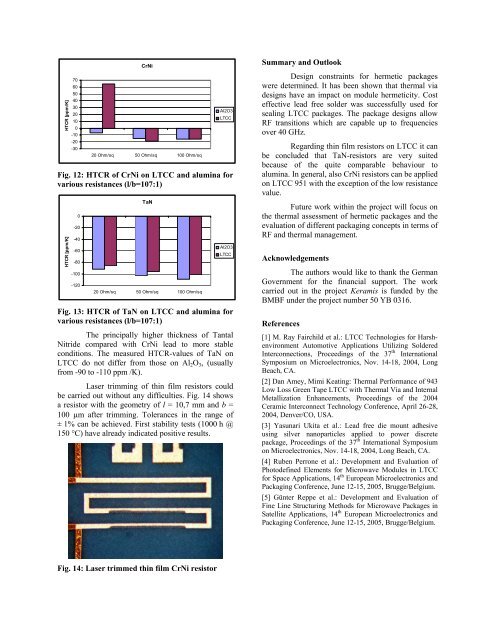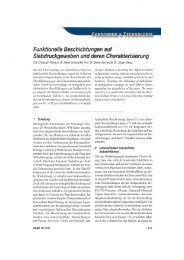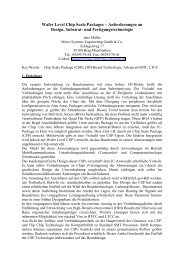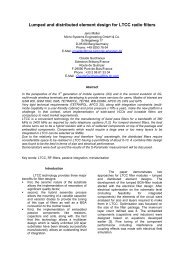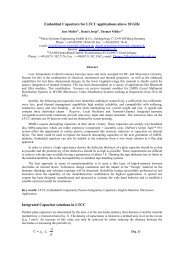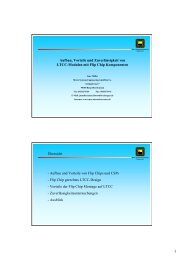View - Micro Systems Engineering
View - Micro Systems Engineering
View - Micro Systems Engineering
You also want an ePaper? Increase the reach of your titles
YUMPU automatically turns print PDFs into web optimized ePapers that Google loves.
HTCR [ppm/K]<br />
70<br />
60<br />
50<br />
40<br />
30<br />
20<br />
10<br />
0<br />
-10<br />
-20<br />
-30<br />
CrNi<br />
20 Ohm/sq 50 Ohm/sq 100 Ohm/sq<br />
Al2O3<br />
LTCC<br />
Fig. 12: HTCR of CrNi on LTCC and alumina for<br />
various resistances (l/b=107:1)<br />
HTCR [ppm/K]<br />
0<br />
-20<br />
-40<br />
-60<br />
-80<br />
-100<br />
-120<br />
TaN<br />
20 Ohm/sq 50 Ohm/sq 100 Ohm/sq<br />
Al2O3<br />
LTCC<br />
Fig. 13: HTCR of TaN on LTCC and alumina for<br />
various resistances (l/b=107:1)<br />
The principally higher thickness of Tantal<br />
Nitride compared with CrNi lead to more stable<br />
conditions. The measured HTCR-values of TaN on<br />
LTCC do not differ from those on Al2O3, (usually<br />
from -90 to -110 ppm /K).<br />
Laser trimming of thin film resistors could<br />
be carried out without any difficulties. Fig. 14 shows<br />
a resistor with the geometry of l = 10,7 mm and b =<br />
100 µm after trimming. Tolerances in the range of<br />
± 1% can be achieved. First stability tests (1000 h @<br />
150 °C) have already indicated positive results.<br />
Fig. 14: Laser trimmed thin film CrNi resistor<br />
Summary and Outlook<br />
Design constraints for hermetic packages<br />
were determined. It has been shown that thermal via<br />
designs have an impact on module hermeticity. Cost<br />
effective lead free solder was successfully used for<br />
sealing LTCC packages. The package designs allow<br />
RF transitions which are capable up to frequencies<br />
over 40 GHz.<br />
Regarding thin film resistors on LTCC it can<br />
be concluded that TaN-resistors are very suited<br />
because of the quite comparable behaviour to<br />
alumina. In general, also CrNi resistors can be applied<br />
on LTCC 951 with the exception of the low resistance<br />
value.<br />
Future work within the project will focus on<br />
the thermal assessment of hermetic packages and the<br />
evaluation of different packaging concepts in terms of<br />
RF and thermal management.<br />
Acknowledgements<br />
The authors would like to thank the German<br />
Government for the financial support. The work<br />
carried out in the project Keramis is funded by the<br />
BMBF under the project number 50 YB 0316.<br />
References<br />
[1] M. Ray Fairchild et al.: LTCC Technologies for Harshenvironment<br />
Automotive Applications Utilizing Soldered<br />
Interconnections, Proceedings of the 37 th International<br />
Symposium on <strong>Micro</strong>electronics, Nov. 14-18, 2004, Long<br />
Beach, CA.<br />
[2] Dan Amey, Mimi Keating: Thermal Performance of 943<br />
Low Loss Green Tape LTCC with Thermal Via and Internal<br />
Metallization Enhancements, Proceedings of the 2004<br />
Ceramic Interconnect Technology Conference, April 26-28,<br />
2004, Denver/CO, USA.<br />
[3] Yasunari Ukita et al.: Lead free die mount adhesive<br />
using silver nanoparticles applied to power discrete<br />
package, Proceedings of the 37 th International Symposium<br />
on <strong>Micro</strong>electronics, Nov. 14-18, 2004, Long Beach, CA.<br />
[4] Ruben Perrone et al.: Development and Evaluation of<br />
Photodefined Elements for <strong>Micro</strong>wave Modules in LTCC<br />
for Space Applications, 14 th European <strong>Micro</strong>electronics and<br />
Packaging Conference, June 12-15, 2005, Brugge/Belgium.<br />
[5] Günter Reppe et al.: Development and Evaluation of<br />
Fine Line Structuring Methods for <strong>Micro</strong>wave Packages in<br />
Satellite Applications, 14 th European <strong>Micro</strong>electronics and<br />
Packaging Conference, June 12-15, 2005, Brugge/Belgium.


